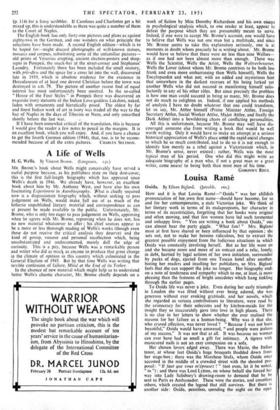A Life of Wells
H. G. Wells. By Vincent Brome. (Longmans. tss.)
MR. BROME'S book about Wells might conceivably have served a useful purpose because, as his publishers state on their dust-cover, this is the first full-length biography which has appeared since Wells's death in 1946. We already have, however, an excellent book about him by Mr. Anthony West, and have also his own fascinating Experiment in Autobiography. What is chiefly required now is a dispassionate biography which, without seeking to pass judgement on Wells, would make full use of as much of the hitherto unpublished literary material and correspondence as can at present be made available to the public. Unfortunately, Mr. Brome, who is only too eager to pass judgement on Wells, approving when he agrees with Mr. Brome, reproving when he does not, has no new material whatsoever to offer ; his chief sources appear to be a more or less thorough reading of Wells's works (though even these do not receive the critical analysis they deserve) and the kind of gossip, rumour and personal recollection which, being unsubstantiated and undocumented, merely dull the edge of curiosity. This is a pity, because Wells was a remarkable person and writer who did as muck as anyone to produce that great change in the climate of opinion in this country which culminated in the General Election of 1945. But by that time Wells was writing that terrible confession of failure, Mind at the End of its Tether.
In the absence of new material which might help us to understand better Wells's chaotic character, Mr. Brome chiefly depends on a
work of fiction by Miss Dorothy Richardson and his own essays in psychological -analysis which, to one reader at least, appear to defeat the purpose which they are presumably meant to serve. Indeed, if one were to accept Mr. Brome's account, one would have to believe that Wells was not one man but a multitude, and since Mr. Brome seems to take this explanation seriously, one is at moments in doubt whom precisely he is writing-about. Mr. Brome would have us believe that there were no less than nine Wellses- as if one had not been almost more than enough. There was Wells the Scientist, Wells the Artist, Wells the Weliverbesserer, Wells the Lover (about whom Mr. Brome contrives to be both less frank and even more embarrassing than Wells himself), Wells the Encylopaedist and what not; with an added and mysterious hint that somewhere in the darkest recesses of his being lurked yet another Wells who did not succeed in manifesting himself satis- factorily in any of his other roles. But since precisely the problem is how one man could succeed in being so many, Mr. Brome does not do much to enlighten us. Indeed, if one applied his methods of analysis I have no doubt whatever that one could transform, let us say, Mr. Attlee himself (Prime Minister Attlee, Foreign Secretary Attlee, Social Worker Attlee, Major Attlee, and finally the Dark Attlee) into a bewildering chaos of conflicting personalities.
All this is unfortunate, because Mr. Brome may well have dis- couraged someone else from writing a book that would be well worth writing. Only it would have to make an attempt at a serious historical appreciation of Wells's place amid the rapid social changes to which he so much contributed, and to do so it is not enough to identify him merely as a rebel against a Victorianism which, in
Mr. Brome's sense, never existed ; rather, Wells was the most typical man of his period. One who did this might write an adequate biography of a man who, if not a great man or a great writer, came nearer to being-both than most men of his time.
GORONWY REES.






































 Previous page
Previous page